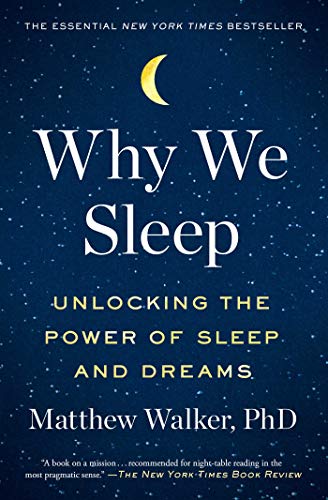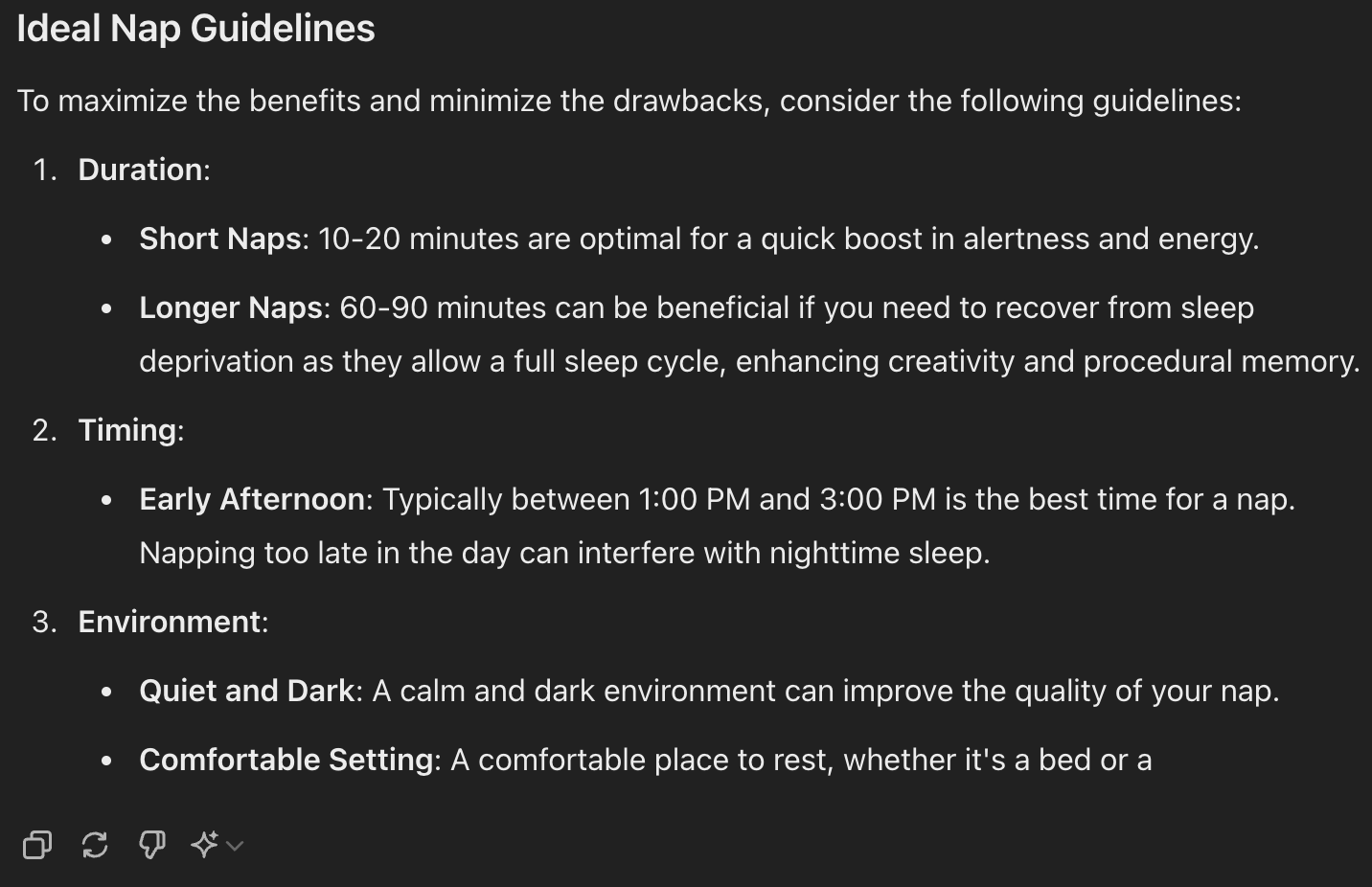When awake, we see only a narrow set of all possible memory interrelationships. The opposite is true, however, when we enter the dream state and start looking through the other end of the memory-surveying telescope. Using that wide-angle dream lens, we can apprehend the full constellation of stored information and their diverse combinatorial possibilities
— Matthew Walker, pg. 203
I have a hunch that most people who identify as "book readers" like to read before bed. In fact, I'm confident that's where a lot of readers get most of their reading done. However, I admit I have no evidence or statistics to back this up; mostly because I'm not a scientist and I haven't done any research. Welcome to my blog.
Fortunately, there are people like Dr. Matthew Walker who IS a scientist and DOES do research before sharing their theories with the world. Walker is a professor of neuroscience at USC Berkeley and he has spent his career studying sleep. This book - Why We Sleep - is his magnum opus; a distillation of decades spent revealing the secrets of the strange, yet essential, nocturnal phase of our existence.

Y'all Sleeping on Sleep
It feels like an injustice to this book to sum it up by saying "sleep is good for you". I was astounded by the breadth of topics covered by Dr. Walker in regards to sleep and its effects on our body and health. Part 2 of the book is entitled "Why Should You Sleep" and I kid you not, the following is an incomplete list of the benefits that adequate sleep has been shown to promote:
- creativity
- emotional regulation
- learning efficacy
- memory retention
- expected lifespan
- decreased psychiatric disorder risk
- decreased injury risk
- decreased cancer risk
- decreased Alzheimer's disease disk
- decreased type-2 diabetes risk
- decreased car crash risk
- increased testosterone levels
- increased testicle size
Yes even that last one. After reading the details of all the studies and methodologies behind proving these correlations, I felt the emotional impact of each lesson began to dull after awhile. Like hearing that the world's on fire every day in the news, being told that sleep is really good for you starts to get repetitive. So I think that Part 2 sort of drags on a bit.
Thankfully, the remainder of Why we Sleep was more focused on how to get better sleep — and what the hell is going on when we dream! I found both these topics to be much more interesting.
Like I mentioned before, I do a lot of reading in bed. This was both a good and bad book to read before sleeping. On the one hand, learning about all the enumerable ways that sleep is good for me was a great headspace to end my day in, allowing my mind to drift off and start to ride those rejuvenating REM and NREM brainwaves.
On the other hand, for the days when I couldn't' sleep, or was going to sleep late, or was in an uncomfortable environment where I wasn't in control of my sleeping space — knowing the exact reasons why I couldn't sleep ("ugh my hands and feet are too hot" ) was almost worse ("agh I looked at a screen too recently") and tended to exacerbate my stress ("shouldn't have had that green tea at 4PM").
But alas, I truly believe that knowledge is powerful and ignorance is not blissful. I chose to read this book because I wanted to know more about sleep and now I do. I took away a lot of interesting information and useful tips. I think this knowledge will help me sleep better, but more importantly I now have random factoids to drop into conversations whenever they turn to sleep.
In particular, I learned that humans naturally have a biphasic circadian rhythm, which is a really cool term to break out at parties. In English, it means we're biologically hardwired to nap once a day. That mid-afternoon lull you feel everyday turns out to be totally natural and not just because your lunch was a big bowl of cheesy gnocchi.
Well, the gnocchi could be part of it honestly (reminder: not a scientist).
Not only is it natural, a short afternoon nap is apparently healthy for you too. Walker points to several studies, some from his own lab, that have illuminated the subtle but measurable ways that a short afternoon nap is beneficial.
Those who were awake throughout the day became progressively worse at learning, even though their ability to concentrate remained stable (determined by separate attention and response time tests). In contrast, those who napped did markedly better, and actually improved in their capacity to memorize facts.
— Walker, pg. 102
From a longitudinal study of Greece and the decline of it's siesta culture over the late 20th century, there was a clear relationship between reduced naps and the risk of heart disease:
However, those that abandoned regular siestas went on to suffer a 37 percent increased risk of death from heart disease across the six-year period, relative to those who maintained regular daytime naps. The effect was especially strong in workingmen, where the ensuing mortality risk of not napping increased by well over 60 percent.
— Walker, pg. 69
Leading to the natural conclusion, in Walker's own words:
From a prescription written long ago in our ancestral genetic code, the practice of natural biphasic sleep, and a healthy diet, appear to be the keys to a long-sustained life.
— Walker, pg. 70
While reading about napping and all its great benefits in Why we Sleep, I was reminded of a headline I'd seen somewhere years ago that said something along the lines of:
BREAKING: New Scientific Study by Scientists Shows Napping Causes Bad Health Things to Happen and You Might Die Sooner, According to Science
That might not be verbatim, but you get the point.
Now I'm not one to believe everything I read on the internet. But I do like to base my entire worldview on a subject according to a single headline I skimmed over once and never looked into further. So needless to say, finding out there was conflicting evidence on the benefits of napping was rather shocking. I was losing sleep over it.
With such uncertainty circling in my head, I felt the need to do more investigation. So I decided to finally put on my scientist hat and do some good old fashioned research on the matter.
Naps: A Literature Review
There have indeed been several studies published over the last couple decades which associated napping with increased risk of hypertension, cardiovascular disease and diabetes, to name a few. According to that last one, the correlation with diabetes risk was "partly explained by adiposity". Adiposity is a really technical term for being fat; and being fat, interestingly enough, was also found to be correlated with regular daytime napping in a separate study! This begs the question — what came first, the couch or the glucose intolerance?
It's hard to say since these long-term epidemiological studies are observational and can only suggest potential causes of a disease based on statistical evidence. The risk of confounding factors makes these studies hard to trust entirely, which is why the conclusions drawn must use wording like:
"increased daytime nap frequency may represent a potential causal risk factor for essential hypertension."
For us normies, these studies lead to clickbait headlines and articles touting the risks of this seemingly benign activity:
- Long Naps May Be Bad For Your Health | Forbes
- Napping regularly linked to high blood pressure and stroke, study finds | CNN
- You snooze, you lose: why long naps can be bad for your health | The Guardian
With all these morbidities being linked to napping, it's easy to see how one could conclude that naps are indeed bad for them. I haven't found any explanations offered as to why napping might be bad for your health; so my research, along with the entire state of nap science, is apparently stalled for now.
But what does our sleep expert, Dr. Walker, say about all this? Walker makes no mention of any of these studies in Why We Sleep (granted, many of them were published after his book was written). Walker's only words of warning come in the Twelve Tips for Healthy Sleep Appendix:
- Don’t take naps after 3 p.m. Naps can help make up for lost sleep, but late afternoon naps can make it harder to fall asleep at night.
— Walker, pg. 325
So, according to Walker, naps are good for you as long as you take them early enough in the day.
Most studies I read as part of my research mentioned nap length as an important factor in these negative health correlations. For example, this study showed those who regularly take short naps (< 30 minutes) were less likely to have high blood pressure, and those who take long naps were more likely to have high blood pressure.
Putting it all together, I've decided my new worldview on naps boils down to the following:
- Napping early in the afternoon for no more than 30 minutes is:
- probably fine
- possibly beneficial for you
- Napping for longer than 30 minutes regularly is:
- possibly bad for you
- more likely a symptom of some other underlying health issue(s) or poor lifestyle habits.
And of course, my final research source was asking ChatGPT, which obviously told me exactly the same thing:

Why bother researching the internet when ChatGPT has already read the whole thing? Oh well, now I know for next time.
Reading books is probably outdated by this point too, but it still helps me get to bed at night. Especially a book like Why We Sleep that evangelises the life-changing power of slumber. So until AI can start singing me lullabies*, I'm clinging to my books!
**editor's note: turns out AI can already do this
